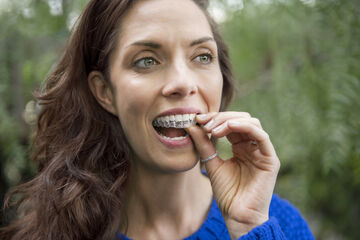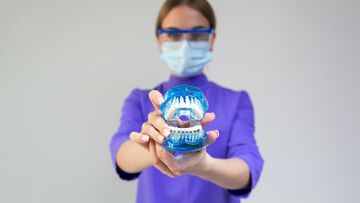Dental implants have increased in popularity over the past few years as a long-lasting solution to replace missing teeth. A dental implant is placed into your jaw and can be used to support one or more teeth. If cared for appropriately they should last as long as your natural teeth.
In this article, we look at what you need to do to ensure that your dental implant lasts for life.
After Dental Implant Surgery
Your dental implant will be placed under local anaesthetic so it is important that you do not eat or drink until the anaesthetic has worn off. This can take anywhere from an hour to two hours. Wherever possible try not to disturb the surgical area for the rest of the day as this gives it a chance to
start healing. Smoking will slow healing, causing increased discomfort and increased chance of dry sockets, which can be incredibly painful. Smoking is strongly discouraged during the healing phase.
It is important to keep the mouth clean. You should brush your teeth the night of surgery, but
be gentle around the surgical sites. If there is minimal bleeding, saltwater rinses may begin 24 hours after surgery (mix 1 tablespoon of salt with 8 ounces of water.) Swish gently and allow the water to drip into the sink. Rinses should be done 2 – 3 times a day, especially after eating. It is also possible to rinse the site with specially designed mouthwashes. Begin your normal oral hygiene routine as soon as possible after surgery. Soreness and swelling may not permit vigorous brushing, but it is extremely important to clean your teeth within the bounds of comfort. Maintaining a clean environment adjacent to the healing of surgical wounds is required for optimum and speedy healing.
Swelling is a normal occurrence after surgery and will not reach its maximum until 2 – 3 days after surgery. It can be minimized by using a cold pack, ice bag or a bag of frozen peas wrapped in a towel and applied firmly to the cheek adjacent to the surgical area. This should be applied twenty minutes on and twenty minutes off during the first 24 hours after surgery.
Following surgery, you may experience some discomfort but this should be easily treated with over the counter painkillers. If you take the first pill before the anaesthetic has worn off, you should be able to manage any discomfort better.
Eat any nourishing food that can be taken with comfort. Avoid extremely hot foods. It is important not to skip meals! If you take nourishment regularly you will feel better, gain strength, have less discomfort and heal faster.
Once the tooth or teeth have been fully restored
Thorough Oral hygiene routine
One of the most important ways to care for your new dental implant is to ensure that you have a good oral hygiene routine in place. Dental implants can be cleaned in the same way as your natural teeth.
You should brush your teeth twice a day using fluoride toothpaste and use interdental cleaning aids such as floss, tape or interdental brushes to clean in between and around the base of the implant. Your dentist will be able to advise you on the best interdental products to use.
Quit Smoking
Smoking is one of the greatest risks to your implant. It is therefore advised that you should try
to quit smoking in order to ensure that your implant has a long lifespan. Your dentist will be able to give you help and advice on smoking cessation. Some dentists will not place implants until you quit smoking because of the increased risk of implant failure.
Maintenance
You should visit your dentists for regular routine appointments in order that the dentist can
check the health of your implants, teeth and gums and can remove any plaque or calculus build up. You will normally be advised to see the dentist every six months but may also need to see the hygienist for regular cleanings to ensure that the tissue around the implant stays healthy. Professional cleaning of implants is more complex than cleaning natural teeth, which means you may find you need longer appointments and the dentist or hygienist will use special instruments to maintain your implants. The dentist will want to make sure that you are caring for your implants as much as you do, so be sure to attend regularly!
If you don’t look after your implant
I not cared for implants will develop a coating of calculus and plaque similar to what you would experience on your natural teeth. If left untreated this can lead to gum disease, bleeding, soreness and general discomfort. In the long term, this can lead to bone loss, with the potential for the implant to fail.
If you need more information or would like to book an implant consultation with one of our highly trained team members please call Leigh Dental Centre on 01702 472929 to book an appointment today.
Contact us to make an appointment
Exclusive Offer
Airflow stain removal from our hygienist
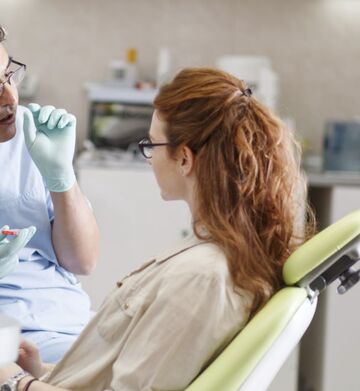
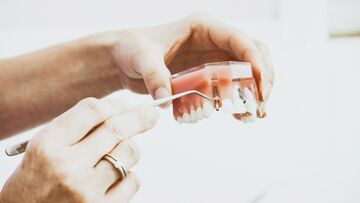
Benefits of Dental Implants
10.04.2024
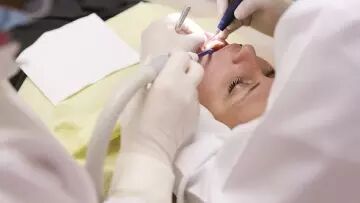
Replacement for a Missing Tooth
04.11.2023
Time for you perfect smile?
Book your consultation today
When visiting our practice you know you are visiting the dental professionals trained to the highest standards. You are greeted by our welcoming staff, who share the same aim, to make your visit with us as comfortable and stress free as possible.
